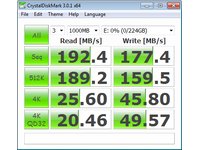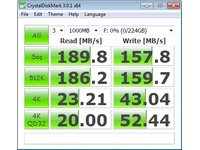Intel’s Z77 Express And Lucidlogix MVP: New Features For Gamers
Integrated USB 3.0, advanced management features, reduced power consumption, and a new software package from Lucidlogix separate the Z77 Express motherboards from the Z68 chipset that preceded it. Were these capabilities worth waiting for?
Z77 Is Only Half Of The Story
Although Intel’s Z77 Express offers minor power reductions and management software updates, integrated USB 3.0 and the inclusion of Virtu MVP are the best reasons for users to care. But didn’t we miss something?


In a side-by-side comparison of third-party PCIe based and integrated Intel USB 3.0 controllers, we found that our drive’s ASM1051 adapter was the bottleneck. That means we’re going to need new test hardware before we add Intel’s USB 3.0 controller to our next controller comparison.
By moving USB 3.0 onto the chipset without reducing the number of available PCIe 2.0 lanes, Z77 allows manufacturers to stuff more devices onto their boards at lower cost. In many instances, this means they can even avoid expensive multi-lane PCIe bridges to bring us enthusiast-class features at mainstream prices. While we probably wouldn’t spend the money to upgrade from Z68, new system builders have nothing to lose and a few small things to gain by choosing a motherboard with Intel’s latest mainstream platform controller hub.
Get Tom's Hardware's best news and in-depth reviews, straight to your inbox.
Current page: Z77 Is Only Half Of The Story
Prev Page HyperFormance And Virtual Vsync In Games-
-Fran- Wasn't the MVP software to account for the "dips" in performance for discrete video cards?Reply
Could you guys provide a video showing the differences between a run with the MVP and without? With V-Sync on also.
Nice review, BTW. Thanks for it 8)
Cheers! -
confish21 Tom, should we expect much of an advantage when ivy bridge is used?Reply
IB and z77 VS. IB and z68? -
s3anister On page three you label the MSI Z68A-GD80 motherboard as Intel Z77 Express when it should obviously be Z68.Reply
Made me do a double take! -
s3anister confish21Tom, should we expect much of an advantage when ivy bridge is used?IB and z77 VS. IB and z68?Reply
Don't expect them to tell you, they're still under Intel's NDA. -
nebun is this a joke? we need to have at lease 2 pcie lanes at 16x speed for serious gaming...2 lanes at 8x will be bringing down your true capability of the graphic cards...thanks but not thanks...i will stick with my x58 chip for nowReply -
jaquith aicomYou bolded PCIE 2.0 for Panther Point but forgot to change it to PCIE 3.0No, the Z77 and all Panther Point chipest are indeed 8x lanes of PCIe 2.0, so Thomas's article is correct. Don't confuse GPU PCIe lanes with Chipset PCIe lanes. However, Thomas knows that I too 'wish' the LGA 1155 was PCIe 3.0 clean, it sure would help with other chipset 'sharing' issues (bottlenecks).Reply -
josejones Where's the performance increase with the z77 over the z68? The new features are a plus but, previews I've seen so far suggest that the z77's are slower than the z68.Reply
What's up with that? Do the z77's require the Ivy Bridge CPU to take full advantage? Sounds like possible driver and/or most likely BIOS issues as others have pointed out elsewhere on page 2 of the z77 Motherboard Discussion thread. -
tmk221 This Lucidlogix Virtu software looks very promising. Certainly it needs a lot of improvment but I think that they will do good job having intel as a partnerReply -
thehidecheck nebunis this a joke? we need to have at lease 2 pcie lanes at 16x speed for serious gaming...2 lanes at 8x will be bringing down your true capability of the graphic cards...thanks but not thanks...i will stick with my x58 chip for nowpoppycock, even high end cards can't even come close to saturateing a 8x slotReply
http://www.youtube.com/watch?v=NFMzRZqFh-w get learned yo
